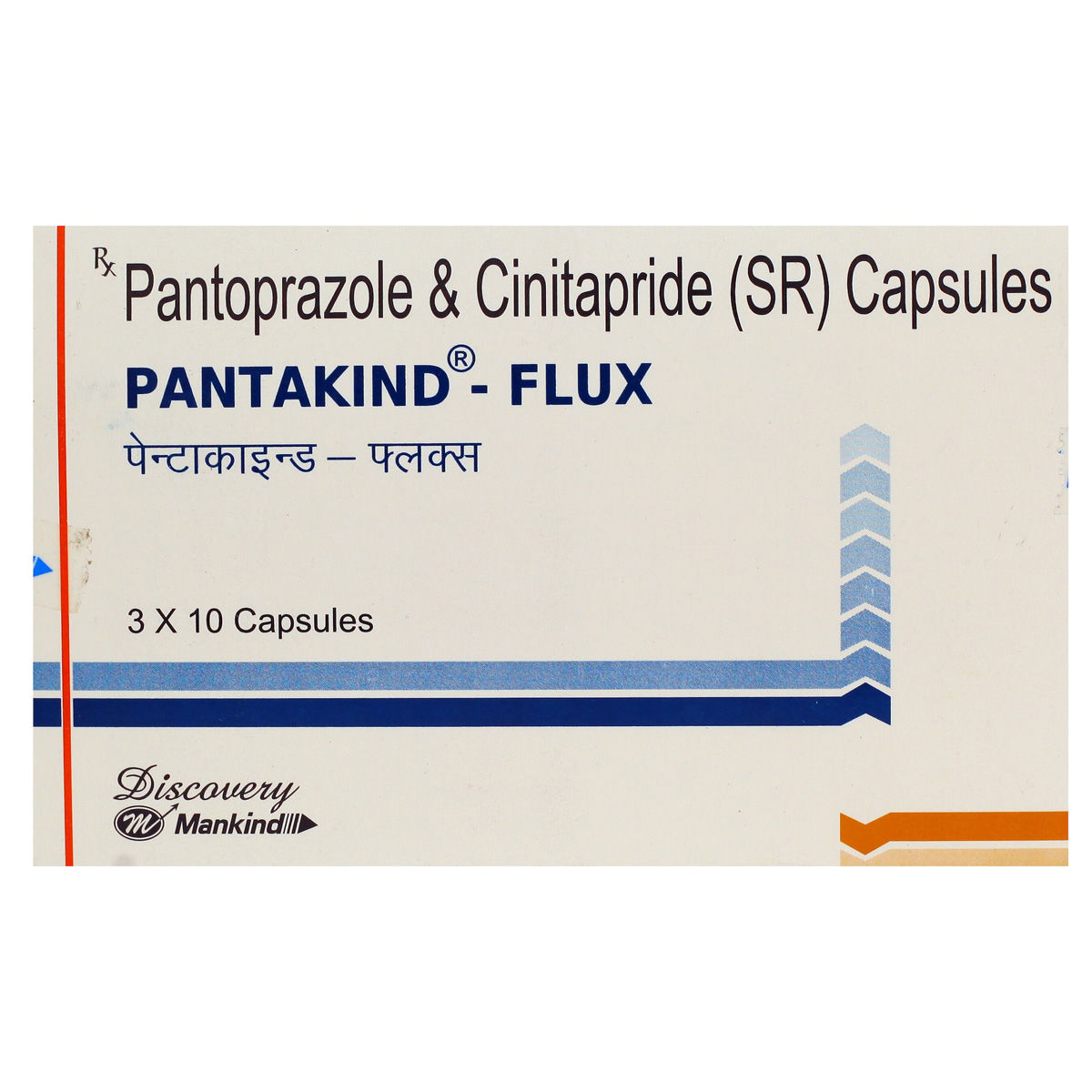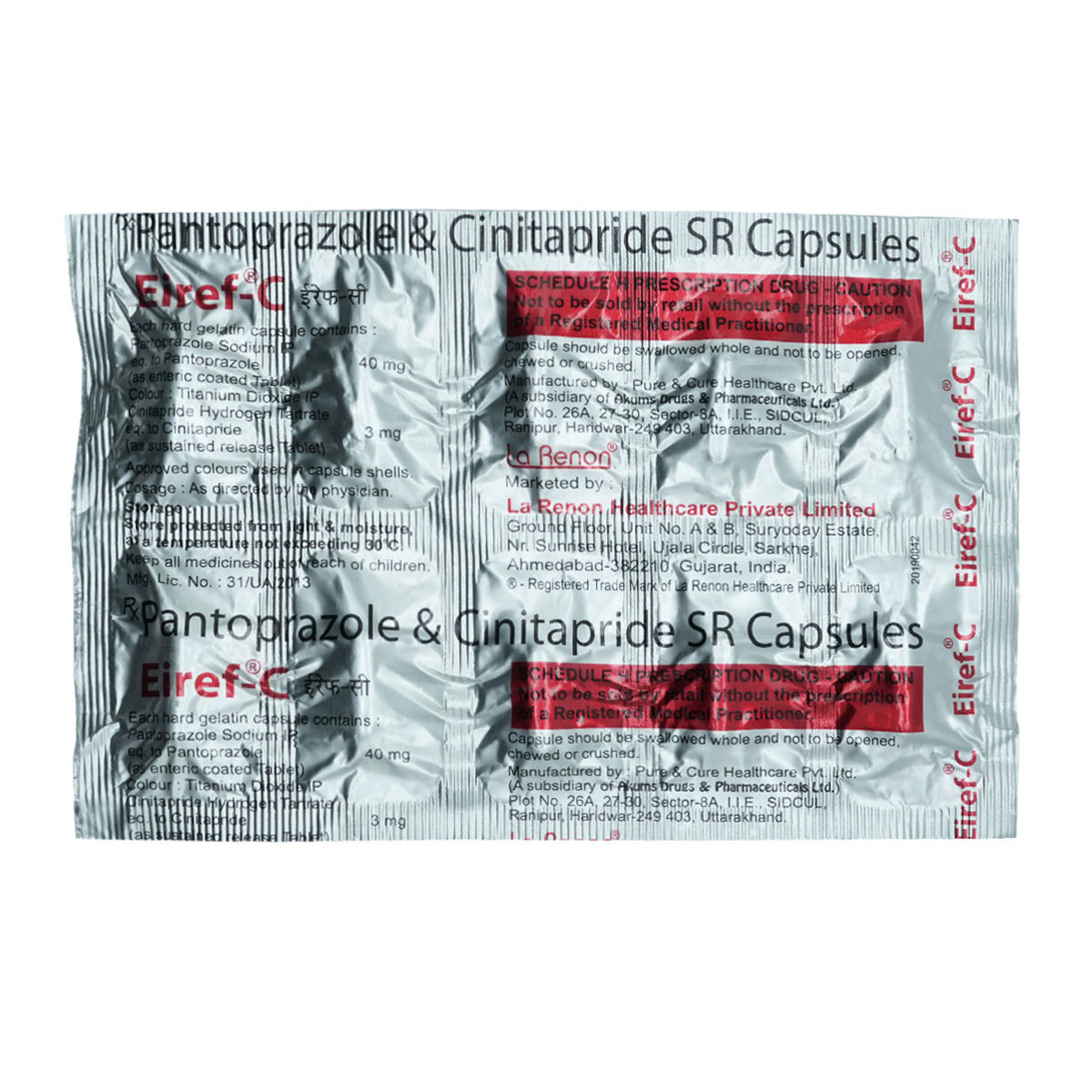Pantoprazole+cinitapride
About Pantoprazole+cinitapride
Pantoprazole+cinitapride is a combination medication used to treat gastro-oesophageal reflux disease (GERD), indigestion, duodenal ulcers, erosive oesophagitis (acid-related damage to the lining of the oesophagus), infections caused by Helicobacter pylori when given along with an antibiotic, and Zollinger-Ellison syndrome. The stomach is usually protected from acid by a mucous layer. In some cases, due to excess acid production, the mucous layer gets eroded, which leads to complications like GERD, acidity, and peptic ulcers.
Pantoprazole+cinitapride contains Pantoprazole and Cinitapride. Pantoprazole works by blocking the action of an enzyme called gastric proton pump, which is responsible for the production of stomach acid. Cinitapride increases the pressure of the inferior oesophageal sphincter, thereby preventing the back-flow of food and acid from the stomach into the mouth. Together, Pantoprazole+cinitapride helps in preventing acid reflux, thereby providing relief from acidity and heartburn.
You are advised to take Pantoprazole+cinitapride for as long as your doctor has prescribed it for you, depending on your medical condition. In some cases, you may experience certain common side-effects such as headache, flatulence, stomach pain, constipation, and diarrhoea. Most of these side-effects do not require medical attention and will resolve gradually over time. However, you are advised to talk to your doctor if you experience these side-effects persistently.
Consult your doctor if you are pregnant or breastfeeding. Pantoprazole+cinitapride may cause dizziness, so drive only if you are alert. Pantoprazole+cinitapride should not be given to children as safety has not been established. Avoid consuming alcohol along with Pantoprazole+cinitapride as it could lead to increased drowsiness and can elevate the production of stomach acid. Keep your doctor informed about all the medicines and your health condition to rule out any side-effects.
Uses of Pantoprazole+cinitapride
Medicinal Benefits
Pantoprazole+cinitapride is a combination medicine used to treat gastro-oesophageal reflux disease (GERD), indigestion, duodenal ulcers, erosive oesophagitis (acid-related damage to the lining of the oesophagus), infections caused by Helicobacter pylori when given along with an antibiotic, and Zollinger-Ellison syndrome. Pantoprazole+cinitapride is a combination of two drugs, namely: Pantoprazole and Cinitapride. Pantoprazole is a proton pump inhibitor which works by blocking the action of an enzyme called gastric proton pump, which is responsible for the production of acid. Cinitapride is a gastro-prokinetic agent which increases the pressure of the inferior oesophageal sphincter, thereby preventing the back-flow of food and acid from the stomach into the mouth. Together, Pantoprazole+cinitapride helps in preventing acid reflux, thereby providing relief from acidity. Pantoprazole+cinitapride increases gastrointestinal motility by enhancing the strength of contractions without disrupting their rhythm, thereby helps in treating indigestion.
Directions for Use
Storage
Side Effects of Pantoprazole+cinitapride
- Headache
- Flatulence
- Stomach pain
- Constipation
- Diarrhoea
Patients Concern
Disease/Condition Glossary
Gastroesophageal reflux disease (GERD): Gastroesophageal reflux disease (GERD) occurs when stomach acid frequently flows back into the food pipe (oesophagus). This backflow (acid reflux) irritates the food pipe and causes heartburn. Symptoms include heartburn, sour or bitter taste in the mouth, and difficulty swallowing.
Peptic ulcers: Peptic ulcers are sores that develop on the lining of the stomach and intestine due to erosion of the stomach's protective lining. Symptoms include nausea, changes in appetite, bloody or dark stools, unexplained weight loss, vomiting, and indigestion.
Indigestion: Indigestion is the feeling of fullness. It occurs due to slow gastric emptying. Symptoms include stomach pain, bloating, heartburn, nausea and vomiting.
Zollinger Ellison syndrome: It is a rare condition in which a gastrin-secreting tumour of the pancreas causes excessive acid production leading to peptic ulcers.
FAQs
Pantoprazole+cinitapride contains Pantoprazole and Cinitapride. Pantoprazole works by blocking the action of an enzyme called gastric proton pump, which is responsible for the production of stomach acid. Cinitapride increases the pressure of the inferior oesophageal sphincter, thereby preventing the back-flow of food and acid from the stomach into the mouth. Together, Pantoprazole+cinitapride helps in preventing acid reflux, thereby providing relief from acidity and heartburn.
Diarrhoea might be a side-effect of Pantoprazole+cinitapride. Drink enough fluids and eat non-spicy food if you experience diarrhoea. If you find blood in stools (tarry stools) or if you experience severe diarrhoea, consult your doctor. Do not take anti-diarrheal medicine on your own.
Avoid lying down immediately after meals to prevent symptoms of acid reflux. After having meal try for 10-15 minutes of brisk walking, especially after having dinner. Raise the head of the bed 10-20 cm by putting a pillow so that the head and chest are above the waist. This helps in preventing acid reflux.
Pantoprazole+cinitapride contains pantoprazole which might increase the risk of bone fracture in the hip, spine or wrist due to decreased level of magnesium in bones. This mainly occurs in people taking higher doses of Pantoprazole+cinitapride for longer durations. Inform your doctor before taking Pantoprazole+cinitapride if you have osteoporosis or if you are taking corticosteroids.
Dry mouth could be a side-effect of Pantoprazole+cinitapride. Limiting caffeine intake, avoiding smoking and mouthwashes containing alcohol, drinking water regularly, and chewing sugar-free gum/candy might help stimulate saliva and thereby prevents drying of the mouth.






